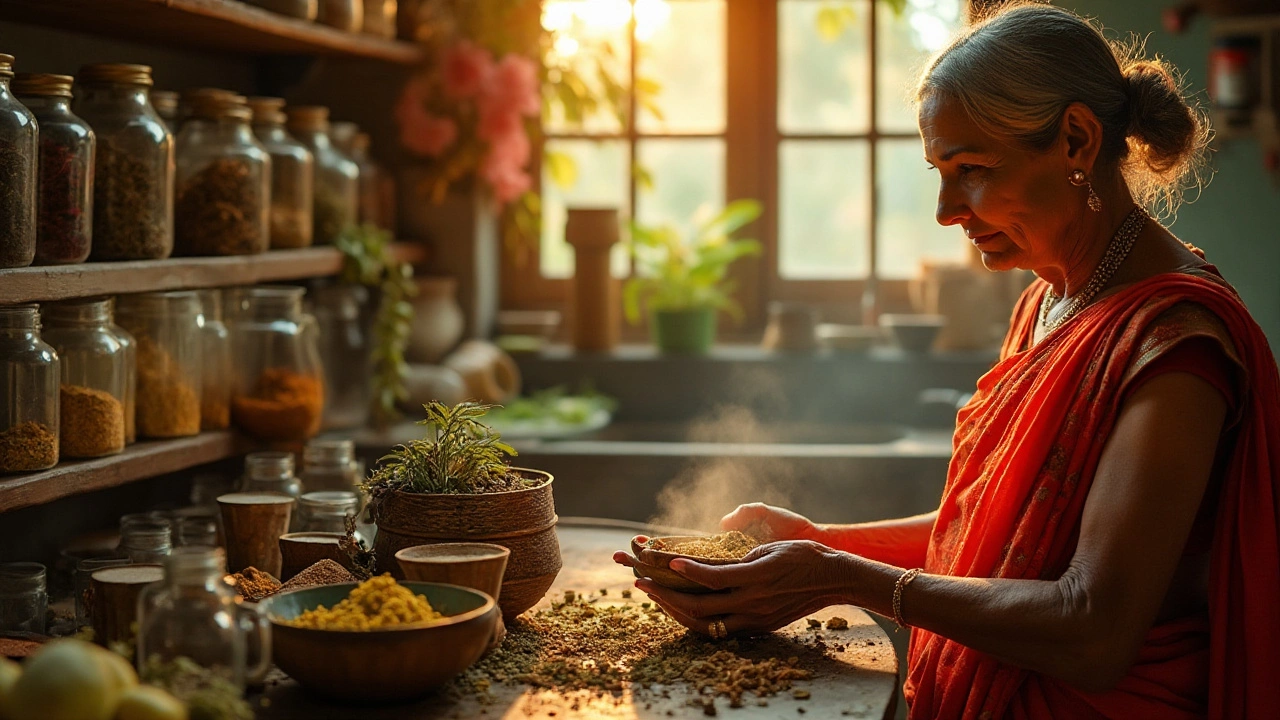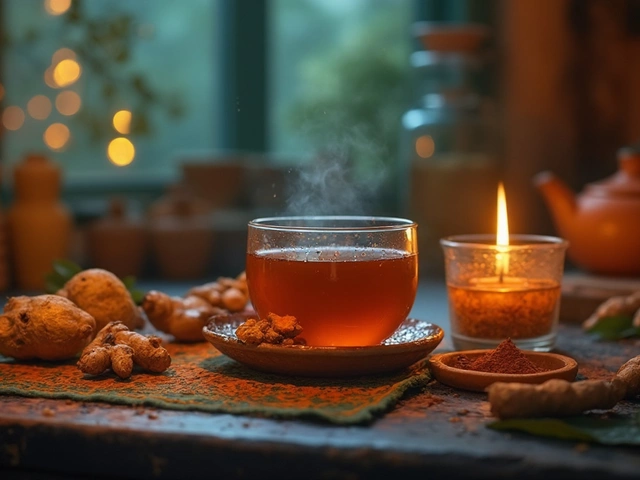
Herbal supplements have gained immense popularity for their natural health benefits. However, the question of their safety, especially concerning liver health, remains a critical topic. While many herbs are celebrated for their healing properties, the liver's essential role as a detoxifying organ can be affected by certain botanical components.
It's crucial to examine which herbs are safe and which could cause potential harm. Not every plant-based remedy is risk-free, and understanding the delicate balance between benefit and risk is key. In this article, we dive into the dynamic relationship between herbs and liver health, offering insights into safe consumption practices and important precautions.
- Understanding the Role of Herbs in Medicine
- Common Herbs and Their Effects on the Liver
- Signs and Symptoms of Herb-Induced Liver Issues
- Safe Practices for Using Herbal Supplements
- Consulting Healthcare Professionals
Understanding the Role of Herbs in Medicine
Herbs have been intertwined with the history of medicine for thousands of years. They form the basis of traditional healing practices across various cultures. Whether it's the ancient Egyptians brimming with encyclopedic knowledge of plants, or India's system of Ayurveda which has been using herbs for over two millennia, herbal medicine has carved a significant niche. Its role isn’t merely about remedy, it's about enhancing the holistic balance of body and mind. The resurgence of herbal supplements today stems from an intrinsic desire to return to nature, benefiting from what is often perceived as purer wellness.
However, using herbal supplements safely demands more than just sprinkling leaves into a potion. Scientific research backs many benefits of herbs, but ignoring their risks is unwise. Take milk thistle, celebrated for its protective effects on liver cells. It's grounded on substantial research, showing how its active compounds combat oxidative stress in the liver. Meanwhile, herbs like kava have also gained notoriety for being potentially harmful, linked to liver damage in some users. Understanding these nuances is crucial, differentiating between what truly aids and what might inadvertently harm liver health.
Essentially, the active components in herbs may interact with bodily systems much like pharmaceutical drugs. St. John's Wort, for instance, stands out for its popularity in treating mild depression, yet it can interact with medicines by accelerating their breakdown in the liver. No herb functions in a vacuum; its interactions and contraindications play a pivotal role in its safety and efficacy. This understanding nudges us towards a cautious yet respectful approach to herbal use.
The World Health Organization acknowledges the significance of traditional medicine, stating, "Traditional medicine has a long history, and is the sum total of the knowledge, skills, and practices based on the theories, beliefs, and experiences indigenous to different cultures."
Herbs also encompass a vast array of bioactive compounds, from alkaloids to flavonoids, each with unique pharmacological properties. These compounds have prompted modern science to isolate active ingredients for use in drugs or study them for their potential in combating ailments. For example, salicin from willow bark paved the way for aspirin, illuminating how ancient wisdom fuels contemporary advancements. Yet, the natural composition of plants can vary significantly due to factors such as soil, climate, and harvest, adding to the complexity of herbal medicine.
Before delving deep into supplements, understanding the origins of these plant materials matters significantly. Their medicinal potency isn’t just about their inherent nature but also how they are grown, processed, and administered. The purity of herbs plays an enormous role; contaminants can turn beneficial supplements into harmful concoctions. Given this, quality control in herbal supplements becomes paramount to ensure that what is consumed is both effective and safe.
Modern appreciation for herbs in medicine leans heavily on integrating them into comprehensive healthcare systems, sometimes blending them with modern treatments. This combined approach is welcomed in integrative medicine, which seeks to harmonize herbal wisdom with scientific precision. Such blending offers an avenue for optimizing patient health, throwing the door wide open for herbs to sit comfortably alongside conventional treatments.
Common Herbs and Their Effects on the Liver
Herbs have long been integrated into various medicinal practices around the globe, touted for their myriad health benefits. However, their appropriateness, especially in terms of liver toxicity, varies widely. The liver is the body's chemical workhouse, orchestrating the metabolism of nutrients and detoxification of harmful substances. Hence, it interfaces significantly with any herbal supplements intake.
One herb often discussed is kava, traditionally used in South Pacific cultures for its relaxing properties. Increasing concerns have arisen around kava's hepatotoxic potential, with some studies linking it to cases of liver failure and hepatitis. The root of the risk might dwell in the specific compounds, called kavalactones, interacting with liver enzymes. Ensuring the proper doses and pure forms can mitigate potential risks, but alarm remains.
Dr. Michael Rieder, a noted pharmacologist, once said, "The natural label doesn’t necessarily denote safety. Nature’s chemistry can be helpful; it can also be harmful."
Then there’s green tea extract, celebrated for its antioxidant prowess. Yet, concentrated forms have been related to liver damage in rare instances. Scientists speculate that the catechins in high doses may overburden the liver’s metabolic pathway, accentuating the need for regulated consumption. A daily cup of green tea offers benefits, but it’s when the concentrated extracts are abused that dangers lurk.
Conversely, milk thistle stands out as a beacon for liver health. Known scientifically as Silybum marianum, its extract, particularly silymarin, is widely considered beneficial in comforting liver ailments. It is often recommended as a complementary therapy for liver conditions. Milk thistle’s protective attributes lie not only in its antioxidative capabilities but also its ability to enhance cell regeneration.
Let's not forget turmeric, or more specifically, curcumin, its active compound. While turmeric has been lauded for its anti-inflammatory virtues that support liver health, high doses can obstruct the effectiveness of some pharmaceutical enzymes. Balancing its intake within dietary rather than supplementary form is often advisable, ensuring no compromise on liver safety.
Indeed, many herbs offer enchanting promises, yet with each benefit comes the responsibility of knowledge. Understanding the potential impacts of herbs on liver health is essential in preventing adverse effects. Carefully considering sources, dosages, and individual health situations can help harness their advantages while avoiding detriment.

Signs and Symptoms of Herb-Induced Liver Issues
Spotting the signs of liver issues due to herbal supplements isn't always straightforward. The liver, often dubbed the body's detox powerhouse, can exhibit irritation or damage in subtle ways that might initially go unnoticed. People probably imagine glaring symptoms when thinking of liver trouble, but the truth is that early manifestations can be rather sneaky. It's important for anyone using herbal remedies, especially those less familiar with their effects, to be well-versed in these potential indicators.
One early symptom to watch for is general fatigue. While tiredness can result from a variety of factors, in the context of liver toxicity, it may accompany other more specific signs. Some individuals might experience unexplained itchiness, a reflection of bile accumulating in the bloodstream rather than properly being processed by the liver. Digestive issues, such as nausea or loss of appetite, often begin to surface as the liver struggles to cope with herbal compounds it's not used to.
Dr. Laura Nelson, a hepatologist, once mentioned, "Patients who use herbal medicines should watch for subtle changes in energy and digestion as these can be telling signs of liver stress."Jaundice, characterized by a yellowing of the skin and eyes, is one of the more recognizable symptoms but typically occurs further along the course of liver disorder. Pain or swelling in the upper right side of the abdomen can also be a red flag, indicating inflammation or enlargement of the liver.
In some instances, herbs might cause flu-like symptoms. These can manifest as body aches, mild fever, or headache, often misleading individuals into dismissing them as minor viral infections. Another point of concern is dark urine or pale stools, which signal impaired liver function affecting bile processing. It’s crucial to monitor these bodily changes closely, especially if they occur after starting a new herbal regimen. Understanding these signs, while simultaneously recognizing their subtlety, fosters an informed approach to using natural remedies safely.
Safe Practices for Using Herbal Supplements
Herbal supplements can be a beneficial addition to your health regimen, but it's important to use them wisely. Understanding how herbs interact with the body, especially the liver, requires both knowledge and mindfulness. Not every plant-based product is safe for everyone, and considering the complexity of individual health conditions is key to mitigating risks. It's essential to recognize that 'natural' doesn't always mean 'harmless', and being informed about potential interactions and side effects can safeguard your liver health. Start by consulting with a healthcare professional who has experience in herbal medicine. This is particularly important if you are currently taking prescription medications, as certain herbal supplements can interact adversely with pharmaceuticals.
A stepwise approach can be beneficial when introducing herbs into your diet. Begin with a low dosage, allowing your body to adjust while monitoring for any adverse reactions. Gradually increase the amount if no negative symptoms arise, but always adhere to the recommended dosages provided on the label or by your healthcare provider. Consider investing in high-quality supplements from reputable sources to ensure purity and potency. Products that are standardized and have undergone rigorous testing are more likely to be both effective and safe.
Checking the sources and background of your supplements is also a vital practice. Opt for brands that provide transparency about their sourcing, manufacturing, and testing processes. For added assurance, look for third-party certifications that confirm the product meets high standards of quality. Keep in mind that herbal supplements are not regulated as strictly as pharmaceuticals in many regions, so due diligence is necessary to avoid products with hidden or harmful ingredients. Incorporating diet and lifestyle changes can amplify the benefits of natural remedies. A well-rounded approach that includes a balanced diet, regular exercise, and adequate hydration helps support the liver's natural detoxifying abilities.
"Herbs can be powerful allies to our health, but like any potent tool, they must be used with care and respect," says Dr. Jane Foster, a renowned herbalist. "Listen to your body and consult with professionals who understand the intricacies of herbal medicine."
Personalizing your herbal regimen can be effective in aligning with specific health goals while minimizing risks. Keep a health journal to note the effects of each supplement on your body, adjusting as necessary based on your observations and feedback from healthcare professionals. Above all, maintaining open communication with your healthcare provider ensures your approach remains safe, personalized, and data-driven, considering your unique health profile and any underlying conditions that might affect how your body processes herbal supplements.
Lastly, be aware of the signs that may indicate liver distress or dysfunction when using herbs. Symptoms like jaundice, abdominal pain, or unusual fatigue should prompt immediate consultation with a healthcare provider. Early detection of liver issues can prevent serious complications and ensure that herbal supplements continue to serve as a safe complements to your health.

Consulting Healthcare Professionals
When it comes to integrating herbal supplements into your health regimen, the counsel of healthcare professionals is indispensable. The liver functions as the body's primary filter, processing nutrients and breaking down substances, and it's crucial to ensure any herbal intake doesn't disrupt this vital role. Unlike pharmaceuticals, herbs are not always subjected to stringent testing, which makes understanding their effects on liver toxicity even more important. A healthcare professional, such as a doctor or licensed herbalist, can provide insights tailored to your individual health needs, help you discern which herbs might benefit or harm your liver, and guide appropriate dosage to prevent unnecessary health risks.
A consultation ensures that all medical records are reviewed; thus, potential interactions with current medications and health conditions are thoroughly evaluated. This is particularly critical for individuals with pre-existing liver conditions or those on medication with known hepatotoxic side effects. For instance, a person with hepatitis C or fatty liver disease usually needs to be extra cautious when it comes to supplementing with herbs. Engaging a healthcare professional can aid in navigating this complex landscape, providing clarity and confidence regarding which natural remedies align with both immediate health goals and current treatments.
In dialogue with a healthcare professional, critical assessments on lifestyle factors and herbal supplement quality can also take place. These discussions are crucial because purity varies widely in supplements, with some carrying fillers or contaminants that could exacerbate liver strain. A practitioner can recommend reputable brands known for quality and suggest practical steps for monitoring liver health, such as regular liver enzyme tests that reflect the organ's condition. This comprehensive strategy supports a balanced approach to herbal usage, where benefits are maximized, and risks are minimized.
Many healthcare professionals emphasize the importance of keeping communication open regarding supplement use. "Transparency between patient and provider is key," explains Dr. Linda Hong, a well-respected hepatologist. "Patients should feel empowered to discuss any supplements they're taking, allowing us to protect their liver health intelligently and effectively." This quote underscores the necessity of partnership in healthcare, reminding us that the journey to optimal health is a collaborative one.
Statistics suggest that around 30% of individuals using natural remedies do not inform their doctors, often leading to unnoticed supplement-drug interactions. A study from the National Institutes of Health highlighted that educated guidance not only enhances the potential benefits of natural remedies but also ensures safety and efficacy in liver health management. By consulting with a healthcare professional, you create a blueprint for wellbeing that accounts for all factors, offering peace of mind and health security.





Rohan Talvani
I am a manufacturing expert with over 15 years of experience in streamlining production processes and enhancing operational efficiency. My work often takes me into the technical nitty-gritty of production, but I have a keen interest in writing about medicine in India—an intersection of tradition and modern practices that captivates me. I strive to incorporate innovative approaches in everything I do, whether in my professional role or as an author. My passion for writing about health topics stems from a strong belief in knowledge sharing and its potential to bring about positive changes.
view all postsWrite a comment